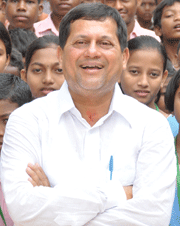Dilip Thakore interviewed Dr. Achyuta Samanta, the visionary founder- director of KIIT University and the Kalinga Institute of Social Sciences (KISS) on the KISS campus in Bhubaneswar. Excerpts:
 To have promoted and established kiit as one of india’s top 20 private universities within 15 years is a commendable and extraordinary achievement. What were the aims and objectives behind the promotion and development of the Kalinga Industrial Institute in 1997?
To have promoted and established kiit as one of india’s top 20 private universities within 15 years is a commendable and extraordinary achievement. What were the aims and objectives behind the promotion and development of the Kalinga Industrial Institute in 1997?
My father who worked in a steel plant was killed in a train accident when I was only four years old. Therefore together with my two brothers and four sisters, I experienced a very deprived and difficult childhood in Kalarabank, a remote village in Cuttack district, often having to subsist on one square meal in two days. However through-out these difficult childhood years, I steadfastly continued my studies in the village government school and won a scholarship to college. In college and university I studied very hard in a disciplined manner to eventually qualify for a Masters degree in chemistry. With my education I was able to get work as a private tutor and later as a chemistry lecturer in a college. In short, I learned the value of education the hard way and it became my purpose and mission in life to pass on the gift of education to all — especially the poorest of the poor — to enable them to lift themselves out of poverty as I did.
How satisfied are you that these aims and objectives have been achieved?
I’m satisfied that we have built a strong platform for education and skills development, and have acquired valuable experience in institutional management. We have also built a large bank of goodwill which we can encash, and age is on my side. I am confident that I will be able to expand our operations and do much more in the cause of education and poverty eradication.
Looking back over the past 20 years, what would you say are the factors behind the success of KIIT University?
I believe it was focused dedication to clearly defined goals, honest intention and the good interpersonal skills of our people. Moreover our energies were focused entirely on developing KIIT University and KISS, and not diffused across a large number of projects. Besides we have a frugal institutional culture which enables us to plough all the profits of KIIT University into expansion and development of KIIT and KISS.
KIIT is described as a self-financing university. However, official policy and the Supreme Court have from time to time criticised “commercialisation of education”. What’s your comment?
The tuition fees that we charge are allowed by the Fees Committees establ-ished by state governments and headed by retired high court judges. Moreover while the Central and state government colleges spend Rs.15-20 lakh per engineering and medical student in government colleges, we charge stud-ents half as much. Indeed private institutions of higher education in India charge the lowest fees worldwide for professional education programmes.
What was the motivation behind promotion of Kalinga Institute of Social Sciences?
As recounted earlier I experienced a difficult childhood. But when I grew up, I became aware that the deprivation and neglect that tribal children routinely experience is much worse. They are totally ignorant and live in a world of superstition and ignorance. Therefore at a young age I resolved to do everything possible to educate them to rise out of poverty. Tribal/aboriginal people constitute 25 percent of Odisha’s population and there’s no way the state can progress unless this significant minority is transformed from a liability into an asset.
The general perception is that it is very difficult to get adequately trained teachers and faculty in Odisha. What’s your comment?
It is very difficult. But if we build reputable institutions and match the best pay scales it is possible to attract high quality faculty, as we have done in KIIT and KISS. Because of incre-asing awareness of the tremendous power of education to transform lives, the demand for dedicated and comm-itted teachers is growing. I’m sure that in the near future the brightest and best graduates will enter this profession.
What are your medium and long-term growth and development plans for KIIT and KISS?
KIIT University has reached its optimal expansion capability and now our focus within the university will be on continuously improving quality of teaching, academics and research. Therefore, henceforth all our expansion and outreach efforts will be concen-trated in KISS. We have drawn up a plan to promote KISS-type institutions in eight tribal areas of Odisha and other eastern India states.
Moreover now that we have demon-strated our capability to provide quality holistic education to the poorest of the poor, I am confident that we will be able to raise funding from the Central and state governments and from Indian industry to establish more KISS model schools for scheduled castes and tribal children countrywide. Meaningfully educating and mainstreaming children from bottom-of-the-pyramid families is the best prescription for combating the Naxalite insurgency confronting the nation, and raising the poor majority out of poverty.